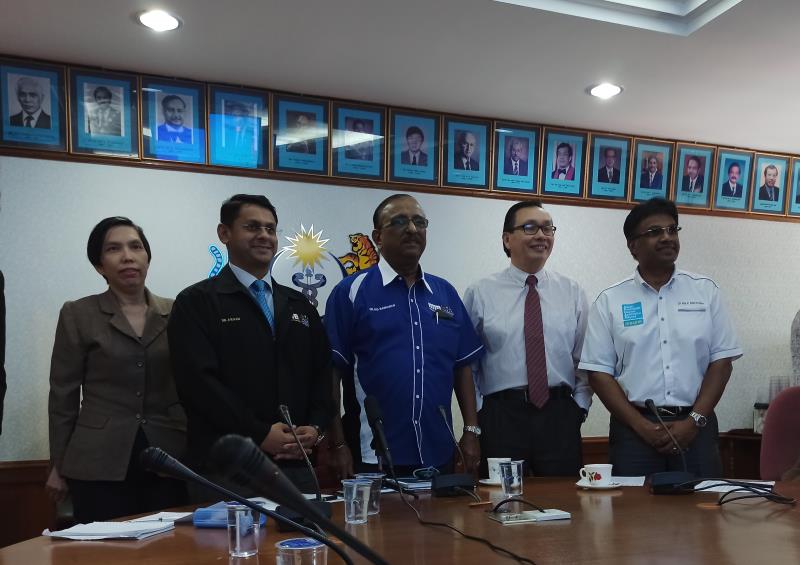 L-R: Rissa Soetama, general manager of MMA, Dr. Thirunavukarasu Rajoo, Honorary General Secretary of MMA, Dr N. Ganabaskaran, president of MMA,,Datuk Dr Christopher Lee, ex-Deputy Director-General of Health (Research and Technical Support), Ministry of Health Malaysia, and Dr Raj Kumar Maharajah, president of MPCAM.
L-R: Rissa Soetama, general manager of MMA, Dr. Thirunavukarasu Rajoo, Honorary General Secretary of MMA, Dr N. Ganabaskaran, president of MMA,,Datuk Dr Christopher Lee, ex-Deputy Director-General of Health (Research and Technical Support), Ministry of Health Malaysia, and Dr Raj Kumar Maharajah, president of MPCAM.Speaking at a media briefing, Datuk Dr Christopher Lee, who recently retired as the Deputy Director-General of Health (Research and Technical Support), Ministry of Health Malaysia, said that China is witnessing a consistent reduction in new cases and an uptrend of persons recovering from the disease. As such, the worst may be over for China. While the heat lets up on China, other countries may serve as a new hotspot for COVID-19, noted Lee.
The countries that are currently in the spotlight are South Korea, Japan and Singapore; countries where new cases are emerging. The fear is sustained community spread, and right now, some cases in those countries are showing no link to any person with a history of travel to China nor any link to someone infected with severe acute respiratory syndrome coronavirus 2 (SARS-CoV-2). This suggests the disease may be spreading within the community.
Due to the close link between Malaysia and the countries with sustained community spread, Lee warned that the country has to continue being vigilant as new cases can emerge any time. As more cases crop up in Singapore, Lee urged for everyone to remain vigilant. More than 300,000 Malaysians traverse the border on a daily basis to earn a living in Singapore, and any one of them can be a potential new case of coronavirus disease 2019 (COVID-19). [Available at https://infographics.channelnewsasia.com/interactive/causewayjam/index.html]
GPs on the frontline of COVID-19
During the media briefing, which was also presided by Dr. Thirunavukarasu Rajoo, Honorary General Secretary of Malaysian Medical Association (MMA); Dr N. Ganabaskaran, president of MMA; and Dr Raj Kumar Maharajah, president of Medical Practitioners Coalition Association of Malaysia (MPCAM), reiterated the importance of GPs’ role in managing the situation. Raj said patients are most likely to go to a GP who they are familiar with rather than a hospital.
Ganabaskaran said MMA has already extracted and simplified an MOH circular detailing the handling protocol of patients suspected to have SARS-CoV-2, cleaning protocol for clinics, and other details pertaining to the current medical climate.
The panel also urged the society at large to refrain from spreading fake news. GPs are not spared from the fake news epidemic, noted Raj. He said some GPs reported a drop in patient visits by up to 80 percent for a few days if word gets out that a patient in their clinic has been suspected to have COVID-19. This is regardless of whether the claim is true or not.
The treatment regime for all COVID-19 patients are currently symptomatic and supportive, noted Lee. Antiviral therapies such as oseltamivir and lopinavir are used as a last-ditch effort should a COVID-19 patient suddenly take a turn for the worse. These antiviral drugs are used sparingly as evidence for their use is so far anecdotal and they come with their own set of side effects, which can be unpleasant. There is no need to subject patients to further hardship unless necessary, said Lee.